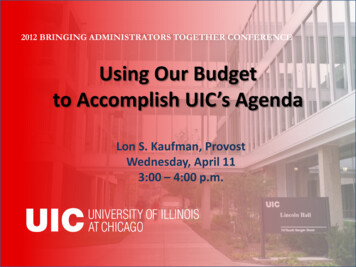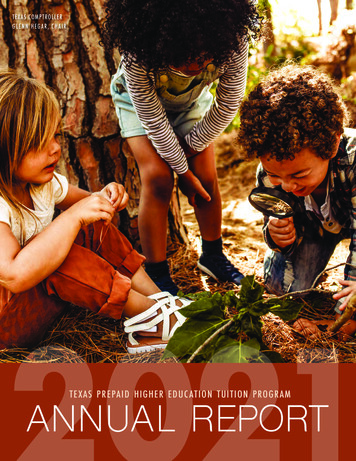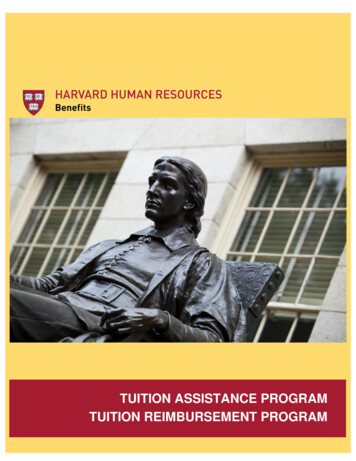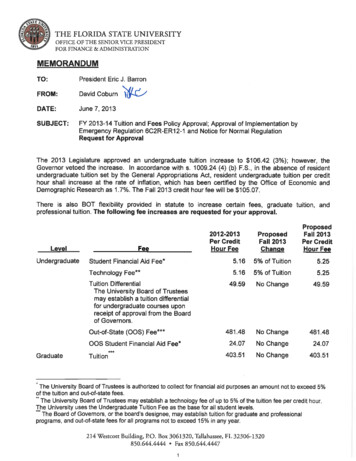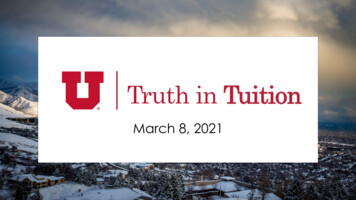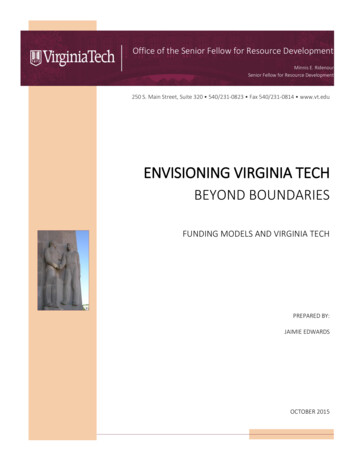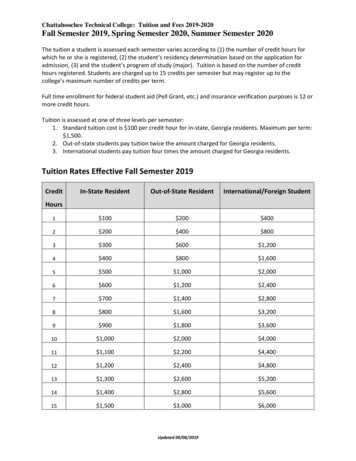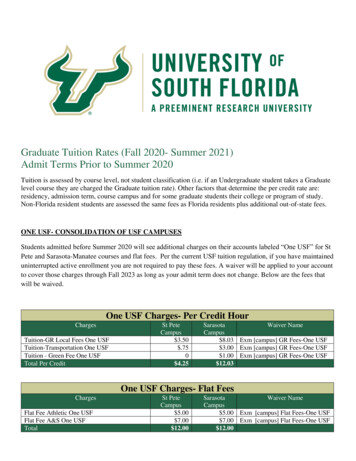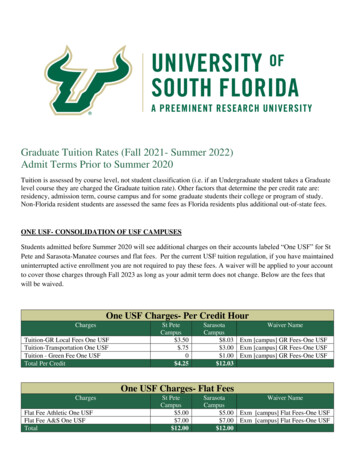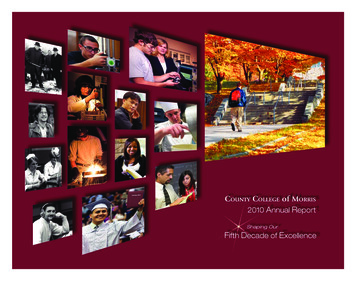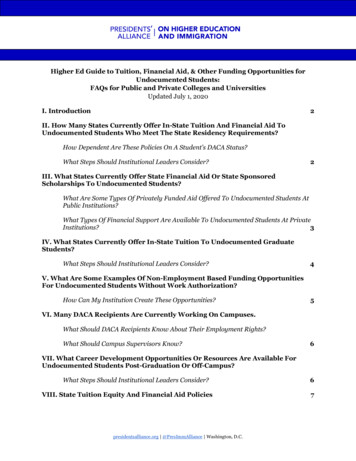
Transcription
Higher Ed Guide to Tuition, Financial Aid, & Other Funding Opportunities forUndocumented Students:FAQs for Public and Private Colleges and UniversitiesUpdated July 1, 2020I. Introduction2II. How Many States Currently Offer In-State Tuition And Financial Aid ToUndocumented Students Who Meet The State Residency Requirements?How Dependent Are These Policies On A Student’s DACA Status?What Steps Should Institutional Leaders Consider?2III. What States Currently Offer State Financial Aid Or State SponsoredScholarships To Undocumented Students?What Are Some Types Of Privately Funded Aid Offered To Undocumented Students AtPublic Institutions?What Types Of Financial Support Are Available To Undocumented Students At PrivateInstitutions?3IV. What States Currently Offer In-State Tuition To Undocumented GraduateStudents?What Steps Should Institutional Leaders Consider?4V. What Are Some Examples Of Non-Employment Based Funding OpportunitiesFor Undocumented Students Without Work Authorization?How Can My Institution Create These Opportunities?5VI. Many DACA Recipients Are Currently Working On Campuses.What Should DACA Recipients Know About Their Employment Rights?What Should Campus Supervisors Know?6VII. What Career Development Opportunities Or Resources Are Available ForUndocumented Students Post-Graduation Or Off-Campus?What Steps Should Institutional Leaders Consider?VIII. State Tuition Equity And Financial Aid Policiespresidentsalliance.org @PresImmAlliance Washington, D.C.67
2HIGHER ED GUIDEI. Introduction1The federal impasse on Dreamer legislation in Congress and the uncertain long-term fate ofDeferred Action for Childhood Arrivals (DACA) means that the need to support undocumentedstudents at the state and institutional levels takes on greater urgency. And, in fact, public andprivate higher education leaders have more opportunities to advance changes to promoteeducational equity and access for DACA recipients and other undocumented students at thestate and institutional levels.The purpose of these Frequently Asked Questions (FAQs) is (1) to provide an overview of theexisting tuition equity and financial aid policies for undocumented students at the state andinstitutional levels; (2) highlight promising state action and institutional practices; (3) addressinstitutional policy steps and state advocacy that higher education leaders may want to considerin order to support undocumented students, including actions to identify funding for students ifDACA is terminated.II. How Many States Currently Offer In-state Tuition And Financial Aid ToUndocumented Students Who Meet The State Residency Requirements? HowDependent Are These Policies On A Student’s DACA Status? What Steps ShouldInstitutional Leaders Consider?A growing number of states have successfully expanded access to in-state tuition and statefinancial aid to undocumented students.2 However, in a number of states, tuition equity andstate financial aid policies are dependent on a student’s DACA status. In 21 states and the District of Columbia, all undocumented students who meet stateresidency requirements have access to in-state tuition, regardless of whether they areDACA recipients. In addition, Arizona offers 150 percent of in-state tuition for allundocumented students who meet state residency requirements. In at least 11 additional states, undocumented students, or in some instances only DACArecipients, who meet residency requirements have access to in-state tuition at the state,institutional or system levels.3These FAQs were developed in collaboration with Nicolaus Espitia of the uLEAD Network andthe National Forum on Higher Education for the Public Good, University of Michigan, andRonnie Rios, Presidents’ Alliance Fellow. Nick is a PhD candidate in the joint social work andsociology program at the University of Michigan. Ronnie is a PhD candidate in the School ofEducation, University of Michigan. For questions about this document, please contactmiriam@presidentsalliance.org.2 Details on state policies regarding in-state tuition access for undocumented status are availableat the ULead website (https://uleadnet.org/). Other resources listing specific state policies,board of regents decisions, and other actions include, National Conference of State Legislatures(NCSL), “Tuition Benefits for Immigrant Students” -benefits-for-immigrants.aspx and NationalImmigration Law Center (NILC), “Basic Facts About In-State Tuition for UndocumentedStudents” instate/.3 These 11 states are Arkansas, Delaware, Idaho, Indiana, Iowa, Maine, Massachusetts,Michigan, Mississippi, Ohio, and Pennsylvania.1presidentsalliance.org @PresImmAlliance Washington, D.C.
3HIGHER ED GUIDE At least 15 states and the District of Columbia now offer state financial aid and/orscholarships to undocumented students, though in a number of cases the funding islimited to students with DACA.The full list of states offering various degrees of access to in-state tuition and financial aid can befound below (Section VIII). The Presidents’ Alliance also published a policy brief, “EndingDACA Would Limit Access to Higher Education in Ten States,” that examines the impact ofending DACA on access to enrollment in public institutions and/or in-state tuition in ten states.The brief also provides a comprehensive chart of the policy environment on in-state tuition andstate financial aid in all 50 states and the District of Columbia.Steps to Consider: To prepare for the potential long-term uncertainty around DACA,institutions should seek to advocate for the removal of DACA criteria from in-state tuition orstate financial aid access and external scholarship programs. Higher education leaders shouldencourage the expansion of eligibility criteria to include the broader undocumented studentresident population.To the extent possible and applicable, public and private institutions should work to removeDACA status as required eligibility criteria for funding or program access on their owncampuses. For example, institutions could use date and length of residency in the United States,and attendance and graduation from a U.S. high school as proxy requirements for eligibility.TheDream.US recently revised eligibility for its scholarships so that its scholarships are open toundocumented students without DACA, who have arrived in U.S. before 2014.4 These criteriacan serve as a useful model for institutions and other organizations.As a first step, institutions can audit their existing internal and external scholarships toascertain their eligibility criteria and determine if they can be extended to undocumentedstudents, and if possible, without regard to DACA status. If institutions identify externalfellowships for domestic students that are not open to undocumented students, they shouldconsider advocating for those funders to expand their eligibility criteria.5III. What States Currently Offer State Financial Aid Or State SponsoredScholarships To Undocumented Students? What Are Some Types Of PrivatelyFunded Aid Offered To Undocumented Students At Public Institutions? What TypesOf Financial Support Is Available To Undocumented Students At PrivateInstitutions?Since undocumented students are ineligible for federal student aid, grants, or loans, paying fortuition and associated educational costs represents a significant barrier for these students,including DACA recipients. In at least 15 states and the District of Columbia, undocumentedA number of organizations offer scholarships, financial assistance, and other kinds of supportto undocumented undergraduate students. Examples include TheDream.US, Golden DoorsScholars, Questbridge Scholars (dependent on the partner college criteria), P.D. SorosFellowship for New Americans, MANÁ Scholarship Program, and Scholarship America.5 In spring 2019, Jin Park, a DACA recipient and Rhodes Scholar and Elliot Gerson, publishedan opinion piece in the Chronicle of Higher Education, urging “other scholarships, institutions,and funders to support all qualified students, regardless of immigration org @PresImmAlliance Washington, D.C.
4HIGHER ED GUIDEstudents and/or students with DACA who meet state residency requirements have access tostate financial aid and/or scholarships.In some states, access is specific to an institution. In Delaware, for example, Delaware TechnicalCommunity College and the University of Delaware, “allow undocumented students to beeligible for in-state tuition and financial aid.”6 A number of public institutions offer privatelyfunded aid to undocumented students. In Minnesota, for example, S.F. 1236 establishes thatpublic institutions may use private sources of funding to provide aid to a student eligible forresident tuition, including students without lawful immigration status. In Utah, a bill (S.B. 253)was passed in 2015 providing an exemption to verification of lawful presence for privatelyfunded scholarships administered by colleges and universities for graduates of Utah highschools.A growing number of private institutions consider undocumented students as domestic studentsfor the purposes of admission and financial aid, and/or have identified specific institutionalfunds, external scholarships or other donor funds to support undocumented students. As notedin an earlier Presidents’ Alliance FAQ, it is a best practice to treat undocumented students asdomestic students for the purposes of admission and financial aid. A recently compiled list ofcolleges that provide financial need for undocumented students outlines the practices of fortyinstitutions.7Among a list of top thirty colleges and universities, the overwhelming majority offer fullfinancial aid to undocumented students comparable to other domestic students (click here fordetails). Other institutions have undertaken fundraising for scholarships, solicited donors, andidentified external partner scholarship organizations, scholarship opportunities, and otherfunding sources. Another option is to explore the creation of income sharing agreements (ISAs).Several organizations and institutions offer income-sharing agreements. In 2018, ColoradoMountain College initiated an income-sharing agreement for undocumented students.8IV. What States Currently Offer In-state Tuition To Undocumented GraduateStudents? What Steps Should Institutional Leaders Consider?The recruitment, admission, and funding of undocumented graduate and professional studentsat public and private institutions is an area of much needed advocacy. Public institutions shouldconsider clarifying and/or advocating for the extension of in-state tuition for undocumentedgraduate and professional students (including those without DACA status) who meet stateresidency requirements.“Tuition Benefits for Immigrants,” National Conference of State Legislatures (NCSL)(September 26, 2019): enefits-forimmigrants.aspx.7 “Colleges That Meet 100% of Financial Need for Undocumented Students in 2019-2020,”College Greenlight (August 28, 2019), available udents-in-2019-2020/.8 Resource: TheDream.US and Presidents’ Alliance webinar on different ISAs and options forfunding undocumented students, with a presentation by Kevin James, President of BetterFuture Forward on ISAs, and a discussion with Matthew Gianneschi, Chief Operating Officer,Colorado Mountain College, and Ricshawn Adkins Roane, Chief of Staff, Jack Kent CookeFoundation on why and how they have adopted their versions of the ISA model.6presidentsalliance.org @PresImmAlliance Washington, D.C.
5HIGHER ED GUIDEMost state laws focus on tuition equity for undergraduate students, and it is not clear the extentto which in-state tuition applies to graduate students who meet the state residency criteria.Examples of two states that have explicitly extended in-state tuition to graduate students areOregon and California. Oregon Senate Bill S.B. 859 exempts students who are not a citizen orlawful permanent resident attending a public university from paying non resident tuition as anundergraduate and graduate student. Undocumented graduate students in California who areeligible for A.B. 540 can receive financial support through the California Dream Act and throughseveral forms of employment or private support from California institutions.Institutions can promote the availability of in-state tuition and/or other forms of assistance forundocumented graduate and professional students when it is available. The new UCLAUndocumented Graduate and Professional Student Handbook is an excellent model for bothpublic and private institutions regarding making institutional and state policies visible, clearand welcoming to undocumented students.V. What Are Some Examples Of Non-Employment Based Funding OpportunitiesFor Undocumented Students Without Work Authorization? How Can MyInstitution Create These Opportunities?With the long-term uncertainty around DACA, institutions are encouraged to explore ways toreimagine traditionally employment-based opportunities available to undocumentedundergraduate and graduate students on campus.9 There are a variety of ways to establish nonemployment based fellowships and other funding opportunities for students without workauthorization. While many positions are necessarily employment-based, other opportunities canbe reconfigured as experiential, educational, or training fellowships.See the Presidents’ Alliance’s Higher Education Guide to Funding Opportunities forUndocumented Students for information on implementing funding and experiential learningopportunities for undergraduate and graduate undocumented students, and this guide andwebinar on creating non-employment based fellowships by Immigrants Rising. For graduatestudents, teaching and research assistantships may be able to be reconfigured as curriculumbased training fellowships. At Emory University, teaching fellowships are curriculum-based (seedescription here).It should be noted that there is already a large number of undocumented students withoutwork authorization already enrolled in post-secondary education. A 2017 Migration PolicyInstitute (MPI) report estimated that approximately 124,000 DACA recipients were enrolled inpost-secondary education. In April 2020, a Presidents’ Alliance/New American Economy (NAE)report found that a total 454,000 undocumented students, including adult learners, arecurrently enrolled in postsecondary education in the U.S. Most undocumented students do nothave work authorization. In addition, a 2019 MPI study, commissioned by the Presidents’Alliance, has estimated that 98,000 undocumented students are graduating U.S. high schoolsannually. Many of these immigrant youth were not able to apply for DACA for the first timebefore it was rescinded in 2017.9presidentsalliance.org @PresImmAlliance Washington, D.C.
6HIGHER ED GUIDEVI. Many DACA Recipients Are Currently Working On Campuses. What ShouldDACA Recipients Know About Their Employment Rights? What Should CampusSupervisors Know?It is important for both employees and employers to understand the rights of DACA recipients.A person’s immigration status is personal, private information.Useful resources for students include Your Employment Rights with DACA and TPS fromTheDream.US and Frequently Asked Questions about DACA and Employment from TheNational Immigration Law Center (NILC). For FAQs and guides geared toward employers, seethe FAQ on employment authorization and DACA students from the Presidents’ Alliance and theEmployer’s Guide for Hiring Individuals with DACA or TPS from TheDream.US.VII. What Career Development Opportunities Or Resources Are Available ForUndocumented Students Post-Graduation Or Off-Campus? What Steps ShouldInstitutional Leaders Consider?National organizations and community-based groups offer information and webinars on how toset up as an independent contractor. For example, Immigrants Rising offers a variety ofresources for undocumented individuals on independent contracting. Another organization, theDemocracy at Work Institute (DAWI) is spearheading a Rapid Response Cooperative (RRC)Development Project, which “aims to create replicable, out-of-the-box worker-owned businessesthat provide a pathway to work for DREAMers and undocumented individuals.” See moreinformation here. This may be an excellent resource for students or alumni, and DAWI canprovide technical assistance and guidance on how to set up these businesses. Also see the relatedwebsite, Radiate Consulting Cooperatives, for information about the services and members.Institutions can also highlight funding resources for undergraduate and graduate students.Immigrants Rising provides lists of undergraduate and graduate fellowships. The DreamSummer Fellowship is open to currently enrolled students and alumni from across the country.It provides paid internship opportunities for Dreamers and others, and is open to those withoutwork authorization (the new application cycle starts in early December.)At My Undocumented Life, the Undocugrad series includes reflections and advice forundocumented students considering graduate and professional school. My Undocumented Lifealso provides resources for undergraduate and graduate students. PreHealth Dreamers providesresources for pre-health students, while Hispanic National Bar Association produced a toolkiton how to support Dreamer law students.To the extent applicable and practical, higher education leaders should consider advocating forexpanded access to licensure for undocumented and other immigrant students in their state andon the federal level. This affects students in public and private institutions equally. Access toprofessional and occupational licensing is essential for enabling undocumented students andother immigrant learners fulfill their educational and employment aspirations, especiallyconsidering over 1,100 professions (and about 25 percent of all workers) require licensing. Whilemuch of the advocacy needs to be pursued at the state level, there is also a role for federal action.To learn more, read the Presidents’ Alliance report on the topic (“Expanding Eligibility forProfessional and Occupational Licensure for Immigrants”), developed in collaboration with anumber of partners.presidentsalliance.org @PresImmAlliance Washington, D.C.
7HIGHER ED GUIDEVIII. State Tuition Equity And Financial Aid Policies (Updated July 1, 2020)21 states and the District of Columbia provide access to in-state tuition to all undocumentedstudents who meet the state residency requirements, regardless of whether they have DACA:1. California2. Colorado3. Connecticut104. Florida5. Hawaii116. Illinois7. Kansas8. Kentucky9. Maryland1210. Minnesota1311. Nebraska12. New Jersey13. New Mexico14. New York15. Oklahoma16. Oregon17. Rhode Island18. Texas19. Utah20. Virginia1421. Washington22. District of Columbia (D.C.)Additionally, the following three states provide access to in-state tuition to DACA recipients inall public institutions:1. Arkansas2. Massachusetts3. OhioEastern Connecticut State University is one of four host institutions for the OpportunityScholarship, a private scholarship that provides full out of state tuition up to 20,000 forundocumented students from states that prohibit their enrollment or require them to pay out ofstate tuition.11 The decision to offer in-state tuition to undocumented and DACA students in Hawaii wasmade by the state board of regents.12 Students in Maryland must start out at a community college to be eligible for in-state tuition.13 Minnesota residents (including qualified undocumented residents) are also eligible to payMinnesota in-state tuition rates while attending public institutions in North Dakota.https://www.ohe.state.mn.us/mPg.cfm?pageID 122.14 The Governor of Virginia approved HB 1547 on April 7, 2020. The bill went into effect on July1, 2020.10presidentsalliance.org @PresImmAlliance Washington, D.C.
8HIGHER ED GUIDEThe following four states offer in-state tuition to undocumented students, including DACArecipients, at specific two- and four-year public vania16The following four states offer in-state tuition to students with DACA at specific two and fouryear public he following state offers 150% percent of the in-state tuition rate to undocumented students,including DACA recipients, who meet state residency requirements (less than out of state tuitionrate):1. ArizonaIn the following 15 states and the District of Columbia, all undocumented students, includingDACA recipients, who meet state residency requirements have access to state financial aidand/or andMinnesotaNew JerseyNew MexicoNew YorkOklahomaOregonTexasUtahWashingtonDistrict of Columbia (D.C.)Delaware State University is one of four host institutions for TheDream.US OpportunityScholarship, a private scholarship that provides full out of state tuition up to 20,000 forundocumented students from states that prohibit their enrollment or require them to pay out ofstate tuition.16 Penn State University announced a residency policy effective January 1, 2020, which enablesundocumented undergraduate and graduate students who meet the state residencyrequirements listed in the policy to access in-state tuition. It may serve as a useful model forother institutions and states.15presidentsalliance.org @PresImmAlliance Washington, D.C.
9HIGHER ED GUIDEThe following seven states actively bar access to in-state tuition and/or state financial aidfor all of the state’s undocumented students who would otherwise meet state residencyrequirements, including DACA recipients:1.2.3.4.5.6.7.GeorgiaMissouriNew HampshireNorth CarolinaTennesseeSouth CarolinaWisconsinpresidentsalliance.org @PresImmAlliance Washington, D.C.
Several organizations and institutions offer income-sharing agreements. In 2018, Colorado Mountain College initiated an income-sharing agreement for undocumented students.8 IV. What States Currently Offer In-state Tuition To Undocumented Graduate Students? What Steps Should Institutional Leaders Consider?
